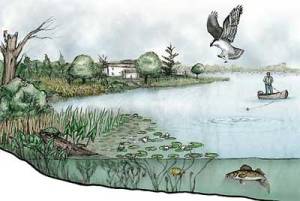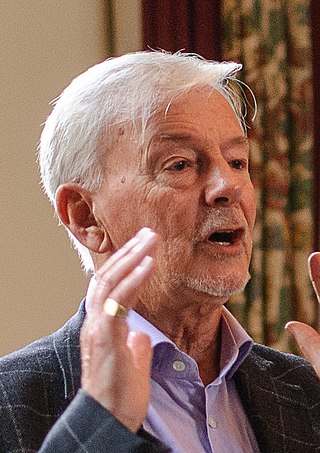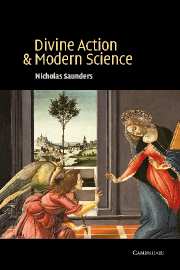Natural theology, once also termed physico-theology, is a type of theology and deism that seeks to provide arguments for theological topics based on reason and the discoveries of science, the project of arguing for the existence of God on the basis of observed so-called natural facts, and through natural phenomena viewed as divine, or complexities of nature seen as evidence of a divine plan or Will of God, which includes nature itself.

The relationship between religion and science involves discussions that interconnect the study of the natural world, history, philosophy, and theology. Even though the ancient and medieval worlds did not have conceptions resembling the modern understandings of "science" or of "religion", certain elements of modern ideas on the subject recur throughout history. The pair-structured phrases "religion and science" and "science and religion" first emerged in the literature during the 19th century. This coincided with the refining of "science" and of "religion" as distinct concepts in the preceding few centuries—partly due to professionalization of the sciences, the Protestant Reformation, colonization, and globalization. Since then the relationship between science and religion has been characterized in terms of "conflict", "harmony", "complexity", and "mutual independence", among others.

Determinism is the philosophical view that events are completely determined by previously existing causes. Deterministic theories throughout the history of philosophy have developed from diverse and sometimes overlapping motives and considerations. Like eternalism, determinism focuses on particular events rather than the future as a concept. The opposite of determinism is indeterminism, or the view that events are not deterministically caused but rather occur due to chance. Determinism is often contrasted with free will, although some philosophers claim that the two are compatible.

Theistic evolution is a view that God acts and creates through laws of nature. It posits that the concept of God is compatible with the findings of modern science, including evolution. Theistic evolution is not in itself a scientific theory, but includes a range of views about how science relates to religious beliefs and the extent to which God intervenes. It rejects the strict creationist doctrines of special creation, but can include beliefs such as creation of the human soul. Modern theistic evolution accepts the general scientific consensus on the age of the Earth, the age of the universe, the Big Bang, the origin of the Solar System, the origin of life, and evolution.
"God of the gaps" is a theological perspective in which gaps in scientific knowledge are taken to be evidence or proof of God's existence.
Mehdi Golshani is a contemporary Iranian theoretical physicist, academic, scholar, philosopher and distinguished professor at Sharif University of Technology. He is also member of Iranian Science and Culture Hall of Fame, senior fellow of Academy of Sciences of Iran and a founding fellow of the Institute for Studies in Theoretical Physics and Mathematics. He is a former member of the Supreme Council of the Cultural Revolution.

The Catholic Church holds no official position on the theory of creation or evolution, leaving the specifics of either theistic evolution or literal creationism to the individual within certain parameters established by the Church. According to the Catechism of the Catholic Church, any believer may accept either literal or special creation within the period of an actual six-day, twenty-four-hour period, or they may accept the belief that the earth evolved over time under the guidance of God. Catholicism holds that God initiated and continued the process of his creation, that Adam and Eve were real people, and that all humans, whether specially created or evolved, have and have always had specially created souls for each individual.

Religious naturalism is a framework for religious orientation in which a naturalist worldview is used to respond to types of questions and aspirations that are parts of many religions. It has been described as "a perspective that finds religious meaning in the natural world."
In philosophy, theophysics is an approach to cosmology that attempts to reconcile physical cosmology and religious cosmology. It is related to physicotheology, the difference between them being that the aim of physicotheology is to derive theology from physics, whereas that of theophysics is to unify physics and theology.

John F. Haught is an American theologian. He is a Distinguished Research Professor at Georgetown University. He specializes in Roman Catholic systematic theology, with a particular interest in issues pertaining to physical cosmology, evolutionary biology, geology, and Christianity.

Keith Ward is an English philosopher, and theologian. He is a fellow of the British Academy and a priest of the Church of England. He was a canon of Christ Church, Oxford, until 2003. Comparative theology and the relationship between science and religion are two of his main topics of interest.
Nancey Murphy is an American philosopher and theologian who is Professor of Christian Philosophy at Fuller Theological Seminary, Pasadena, CA. She received the B.A. from Creighton University in 1973, the Ph.D. from University of California, Berkeley in 1980, and the Th.D. from the Graduate Theological Union (theology) in 1987.
A Scientific Theology is a set of three books by Alister McGrath that explores the parallels between the working assumptions and methods of Christian theology and those of the natural sciences. Scientific Theology is also the "running title" of the project which gave rise to the trilogy. The work is preceded by three volumes that McGrath describes as "landmarks" in the development of his scientific theology: The Genesis of Doctrine: A Study in the Foundations of Doctrinal Criticism, The Foundations of Dialogue in Science and Religion and Thomas F. Torrance: An Intellectual Biography. The trilogy was later summarised in The Science of God. McGrath is working on a "scientific dogmatics" which will deal with the content of Christian theology following the method developed in the trilogy.
Robert John Russell is founder and Director of the Center for Theology and the Natural Sciences (CTNS). He is also the Ian G. Barbour Professor of Theology and Science in Residence at the Graduate Theological Union (GTU). He has written and edited extensively on possible scientific mechanisms of Christian belief.

Issues in Science and Religion is a book by Ian Barbour. A biography provided by the John Templeton Foundation and published by PBS online states this book "has been credited with literally creating the contemporary field of science and religion."
Scientific Perspectives on Divine Action is a five volume set that represents more than a decade of scientific-theological conferences sponsored by the Vatican Observatory and the Center for Theology and the Natural Sciences.

William Grosvenor Pollard (1911–1989) was an American physicist and an Episcopal priest. He started his career as a professor of physics in 1936 at the University of Tennessee. In 1946 he championed the organization of the Oak Ridge Institute of Nuclear Studies (ORINS). He was its executive director until 1974. He was ordained as a priest in 1954. He authored and co-authored a significant amount of material in the areas of Christianity and Science and Religion found in books, book chapters, and journal articles. He was sometimes referred to as the "atomic deacon".
Karl Heim was a professor of dogmatics at Münster and Tübingen. He retired in 1939. His idea of God controlling quantum events that do and would seem otherwise random has been seen as the precursor to much of the current studies on divine action. His current influence upon religion and science theology has been compared in degree to that of the physicist and theologian Ian Barbour and of the scientist and theological organizer Ralph Wendell Burhoe. His doctrine on the transcendence of God has been thought to anticipate important points of later religious and science discussions, including the application of Thomas Kuhn's idea of a paradigm to religion and Thomas F. Torrance's theory of multileveled knowledge. Mention of Heim's physical and theological concept of extra-dimensional space can be found in a 2001 puzzle book by the popular mathematics writer Martin Gardner. His concept of space has also been discussed by Ian Barbour himself, who in a review of the book Christian Faith and Natural Science and in a mention of "its more technical sequel" The Transformation of the Scientific World-View, found it to be "an illuminating insight."
Wesley J. Wildman is a contemporary Australian-American philosopher, theologian, and ethicist. Currently, he is a full professor at the Boston University School of Theology, founding member of the faculty of Computing and Data Sciences, and convener of the Religion and Science doctoral program in Boston University's Graduate School. He is executive director of The Center for Mind and Culture, founding co-director of the Institute for the Biocultural Study of Religion, and founding co-editor of the journal Religion, Brain & Behavior. Wildman's academic work has focused on interpreting religion and building theories of religious beliefs, behaviours, and experiences that acknowledge value in longstanding traditions while attempting to remain intellectually viable in light of the biological, cognitive, evolutionary, physical, and social sciences. He is an important figure in the religion and science field, along with scholars such as Robert John Russell, Nancey Murphy, and John Polkinghorne.









